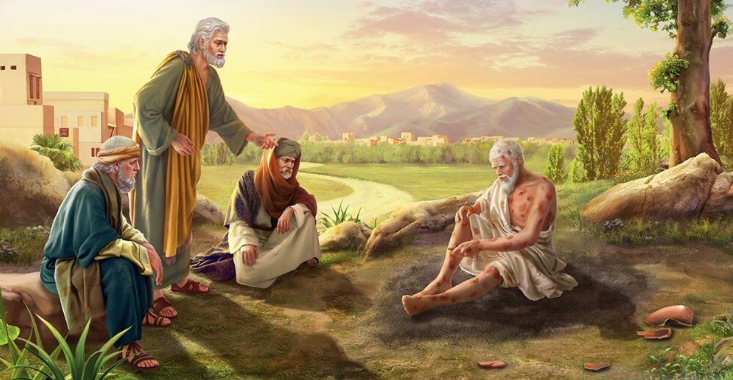
Job, With Friends Like These Who Needs Enemies?
When Job's three friends heard about all this calamity that had happened to him, each of them came from his own country– Eliphaz the Temanite, Bildad the Shuhite, and Zophar the Naamathite. They met together to come to show sympathy for him and to console him. But when they gazed intently from a distance but did not recognize him, they began to weep loudly. Each of them tore his robes, and they threw dust into the air over their heads. Then they sat down with him on the ground for seven days and seven nights, yet no one spoke a word to him, for they saw that his pain was very great. (Job 2:11-13)
Enter the “friends” of Job to provide comfort. Have you ever needed someone to hear what you have to say (e.g., your spouse) and all they want to do is give you advice? Yes, we are bad like that and so are Job’s friends. Remember, God did not like anything these three men had to say about Him (Job 42:7).
The pity party begins (yes, it does take one to know one – been there, done that…).
After this Job opened his mouth and cursed the day he was born. Job spoke up and said: "Let the day on which I was born perish, and the night that said, 'A man has been conceived!' That day– let it be darkness; let not God on high regard it, nor let light shine on it! Let darkness and the deepest shadow claim it; let a cloud settle on it; let whatever blackens the day terrify it! That night– let darkness seize it; let it not be included among the days of the year; let it not enter among the number of the months! Indeed, let that night be barren; let no shout of joy penetrate it! Let those who curse the day curse it– those who are prepared to rouse Leviathan. Let its morning stars be darkened; let it wait for daylight but find none, nor let it see the first rays of dawn, because it did not shut the doors of my mother's womb on me, nor did it hide trouble from my eyes! "Why did I not die at birth, and why did I not expire as I came out of the womb? Why did the knees welcome me, and why were there two breasts that I might nurse at them? For now I would be lying down and would be quiet, I would be asleep and then at peace with kings and counselors of the earth who built for themselves places now desolate, or with princes who possessed gold, who filled their palaces with silver. Or why was I not buried like a stillborn infant, like infants who have never seen the light? There the wicked cease from turmoil, and there the weary are at rest. There the prisoners relax together; they do not hear the voice of the oppressor. Small and great are there, and the slave is free from his master. "Why does God give light to one who is in misery, and life to those whose soul is bitter, to those who wait for death that does not come, and search for it more than for hidden treasures, who rejoice even to jubilation, and are exultant when they find the grave? Why is light given to a man whose way is hidden, and whom God has hedged in? For my sighing comes in place of my food, and my groanings flow forth like water. For the very thing I dreaded has happened to me, and what I feared has come upon me. I have no ease, I have no quietness; I cannot rest; turmoil has come upon me." (NET Job 3:1-26)
In Job 3:25, we have insight that God was already dealing with Job before the scourging started. Job knew something was wrong, “what I feared has come upon me,” but could not put his finger on it. God will chasten us with His word to correct us, and it is only after we refuse to change that scourging begins (Hebrews 12:6. Isaiah 48:10).
When you squeeze a sponge, you can tell what it contains. Even so, it is with our spiritual heart (1). When Satan squeezes us, what is in our hearts comes out of our mouths (Matthew 12:34). This is so we can know what is wrong in our spiritual hearts and seek the Lord to change it.
Nor is there an arbiter between us, who might lay his hand on us both, (Job 9:33).
Job recognized that no one could represent God and Man to pay the price to redeem fallen mankind from Sin and its effects, including sickness.
Even now my witness is in heaven; my advocate is on high. My intercessor is my friend as my eyes pour out tears to God; and he contends with God on behalf of man as a man pleads for his friend.(Job 16:19-20 NET)
Nevertheless, Job speaks of one that pleads to God our Father for mercy towards mankind. He is the one to whom Job pours out his tears in the hope of deliverance. That would be none other than the Word… the pre-incarnate Son of God and Son of Man, the Lord Jesus Christ our Great High Priest! (1)
As for me, I know that my Redeemer lives, and that as the last he will stand upon the earth. (Job 19:25 NET)
Job prophetically speaks of a redeemer that was alive and that in the future would stand on Earth as a man, the God-Man. The Word became flesh and tabernacled amongst us! (John 1:14 ) Hallelujah!
The wisdom the three “friends” shared over nine chapters was not of God but rather earthly, sensual, and demonic (James 3:13-16).
- Earthly Wisdom – Bildad appealed to what he had learned from living on the earth and studying its history. (Job 8:8-10. Job 8. Job 18. Job 25)
- Sensual Wisdom – Eliphaz appealed to what he had learned from observation (i.e., wisdom gained from his senses) (Job 4:7,8). Job 4-5. Job 15. Job 22)
- Demonic Wisdom – Zophar appealed to what he assumed based on his “dead to God” spiritual heart (Job 20:2-3. Jeremiah 17:9. Ezekiel 36:26). (Job 11. Job 20)
These three remind me of the TV special “A Charlie Brown Christmas” where Lucy says,
“Well, as they say on TV, the mere fact that you realize you need help indicates that you are not too far gone. I think we’d better pinpoint your fears. If we can find out what you’re afraid of, we can label it.”
Unfortunately, even in the church today we have friends like these that only offer to help identify (i.e., label) the problem but have no interest in providing healing care! The apostles had fallen into this way of thinking when they asked Jesus about the man that was born blind (John 9:1,2). Jesus could have “labeled” the blindness due to the fall of man that brought sin, sickness, and death into the world (Romans 5:12). Furthermore, He could have “labeled” the blindness due to a deficiency of vitamin “A” which is the leading cause of blindness in developing countries. However, Jesus chose to skip the “labels” that would have provided an understanding of the cause of the blindness but would not have helped the person. Rather Jesus focused on bringing God His Father glory by “labeling” and demonstrating that He is “God the Healer” that desires to heal His children! (John 9:3-7).
Yahweh-Rapha (Rof’ekha ) – The Lord My Healer (1) (Exodus 15:26. Psalm 30:2;103:3)
(New Covenant Equivalent(s): Matthew 4:24;8:1-3;8:16,17. Acts 10:38. 1 Peter 2:24).
So these three men refused to answer Job further, because he was righteous in his own eyes. (NET Job 32:1)
Here is additional evidence of the problem with Job. For twenty chapters, we will find that Job was justifying himself and not God (Job 3. Job 6-7. Job 9-10. Job 12-14. Job 16-17. Job 19. Job 21. Job 23-24 Job 26-31). Yes, at first, Job sounded very religious in his declarations about God. Job probably would have convinced us if we had been there at the time.
Nevertheless, God loves Job so much that to leave him in this self-righteous situation is the last thing He desires to do. You might ask yourself why God is so cruel to permit such suffering in Job’s life and the world?
Which of the following scenarios do you think is cruel?
1. If when Adam had sinned, God still kept the protective hedge around him and his family (Job 1:9,10). Therefore, Adam would have never known that the “wages of sin are death” (Romans 6:23) and would have died thinking everything was fine. Fine, that is until being ushered into Hell and later the Lake of Fire to be eternally separated from God! (Matthew 10:28. Revelation 20:15)
2. If when Adam sinned, the hedge of protection was lifted in ways calculated by God to cause Adam to face his sin. Therefore, Adam would have to face the reality of his own inability and falling on his face before God asks to be saved (1). Then upon death, be ushered into the presence of LOVE Himself! (1 John 4:8)
Indeed, the loss of Abel must have been overwhelmingly painful for Adam (Genesis 4:8). The loss of a child (or baby) will undoubtedly get your attention! Nevertheless, even after my wife and I had two miscarriages on our journey to having five children… I believe that #1 and not #2 is cruel. Yes, I have two little ones waiting on the other side (i.e., Heaven). Not to worry, they have my father-in-law, my younger brother, and many Grandparents and Great Grandparents loving on them!
Then Elihu son of Barakel the Buzite, of the family of Ram, became very angry. He was angry with Job for justifying himself rather than God. (NET Job 32:2)
Near the end of this story, a younger man, Elihu, spoke to Job, and God had no rebuke for him. We will next see what he had to say to Job (James 3:17,18).
To be continued…
The Book of Job Series:
- Job, Suffering is Part of the Job
- Job, God Planned a Happy Ending from the Beginning!
- Job, God is not Your Problem… Satan is!
- Job, God is Your Solution!
- Job, With Friends Like These Who Needs Enemies?
- Job, Do not Despise the Wisdom of the Youth!
- Job, Brokenness is the only Way to Godliness
Shalom
(Security, Wholeness, Success)
Peace
Then he said to them, “Therefore every expert in the law who has been trained for the kingdom of heaven is like the owner of a house who brings out of his treasure what is new and old.” (Matthew 13:52 NET)
(1) Select the link to open another article with additional information in a new tab.



